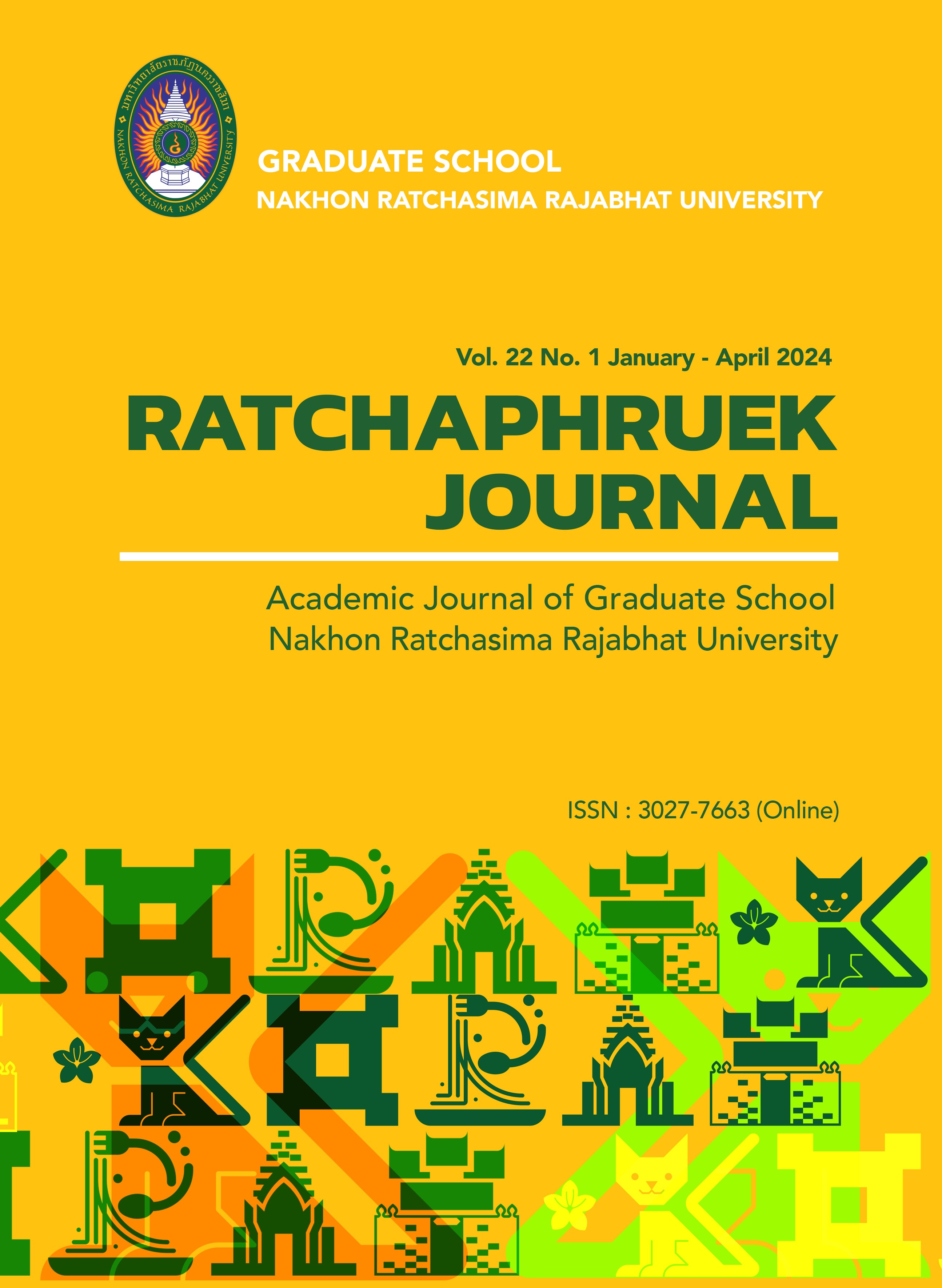Development of Competency-Based Curriculum Based on Experiential Learning Theory to Enhance Local Curriculum Developers Teachers’ Competencies
Main Article Content
Abstract
This research aimed to: 1) Develop an experiential learning-based competency framework to enhance teachers' abilities as local curriculum developers, and 2) To study the outcomes of using the competency-based experiential learning theory curriculum through a research and development approach. The sample were specifically selected and include 30 teachers, 3 school administrators, and 2 educational supervisors. Tools used in the research were frameworks, instructional materials, tests, competency assessments, and questionnaires. Data were analyzed by content analysis, mean values, and standard deviations.
Results revealed that: The experiential learning-based competency framework consisted of 8 components. The framework emphasized competencies in three areas, and the capacity to evaluate curricula and use assessment outcomes for curriculum development. This framework consists of 6 learning units and is rated as highly suitable. Regarding to the curriculum's application were from the post-development, teachers' test scores measuring knowledge and understanding of local curriculum development were significantly higher compared to pre-development scores. Teachers exhibit a high level of competence in developing and utilizing local curricula.
Article Details

This work is licensed under a Creative Commons Attribution-NonCommercial-NoDerivatives 4.0 International License.
References
กรมพัฒนาฝีมือแรงงาน. (2557). กรอบและแนวทางการจัดทำหลักสูตรตามความสามารถ. สืบค้นเมื่อ 8 มกราคม 2563, จาก http://home.dsd.go.th/techno/trainingsystem
ฆนัท ธาตุทอง. (2550). การพัฒนาหลักสูตรท้องถิ่น. กรุงเทพฯ: เพชรเกษม.
เพ็ญศิริ โฉมกาย, สมศิริ สิงห์ลพ และปริญญา ทองสอน. (2562). การพัฒนาหลักสูตรฐานสมรรถนะด้านคุณลักษณะของบัณฑิตนักปฏิบัติมหาวิทยาลัยเทคโนโลยีราชมงคลตะวันออก. วารสารศึกษาศาสตร์ มหาวิทยาลัยนเรศวร, 21(2), น. 189-200.
มนสิช สิทธิสมบูรณ์. (2563). การพัฒนาหลักสูตรเสริมสร้างสมรรถนะการวิจัยในชั้นเรียนด้วยการวิจัยปฏิบัติการแบบมีส่วนร่วม สำหรับครูระดับการศึกษาขั้นพื้นฐาน. วารสารสังคมศาสตร์และมานุษยวิทยาเชิงพุทธ, 5(5), น. 186-199.
รัมภา กุณพันธนาภา และวิเชียร ธำรงโสตถิสกุล. (2560). การพัฒนาหลักสูตรเน้นสมรรถนะการพัฒนาหลักสูตรท้องถิ่นตามแนวคิดการเรียนรู้ร่วมกันที่เน้นการคิดไตร่ตรองสำหรับครู. วารสารศึกษาศาสตร์ มหาวิทยาลัยนเรศวร, 19(1), น. 160-170.
วิไลวรรณ สิทธิ. (2560). การพัฒนาหลักสูตรฝึกอบรมเพื่อเสริมสร้างสมรรถนะด้านการจัดการเรียนรู้ตามแนวคิดคอนสตรัคติวิสต์ สำหรับครูสังกัดสำนักงานเขตพื้นที่การศึกษาประถมศึกษานครพนม เขต 2 (วิทยานิพนธ์ดุษฎีบัณฑิต, มหาวิทยาลัยราชภัฏสกลนคร).
สืบสกุล นรินทรางกูร ณ อยุธยา. (2561). กระบวนทัศน์ รูปแบบและกลไกการพัฒนาครูในลักษณะเครือข่ายเชิงพื้นที่. วารสารการบริหารและนวัตกรรมการศึกษา, 1(3), น. 82-100.
สำนักงานคณะกรรมการการศึกษาขั้นพื้นฐาน. (2553). คู่มือประเมินสมรรถนะครู (ฉบับปรับปรุง). กรุงเทพฯ: ผู้แต่ง.
สำนักงานเลขาธิการคุรุสภา. (2548). มาตรฐานวิชาชีพทางการศึกษา. กรุงเทพฯ: ผู้แต่ง.
สำนักงานเลขาธิการสภาการศึกษา. (2562). การพัฒนากระบวนทัศน์ รูปแบบและกลไกการพัฒนาครู ในลักษณะเครือข่ายเชิงพื้นที่ 5 พื้นที่. กรุงเทพฯ: พริกหวาน.
Bartle, E. (2015). Experiential learning: an overview. Institute for teaching and learning innovation. Australia: The university of Queensland.
Kolb, D. (2015). Experiential learning: Experience as the Source of Learning and Development. Pearson Education: New Jersey, USA.


